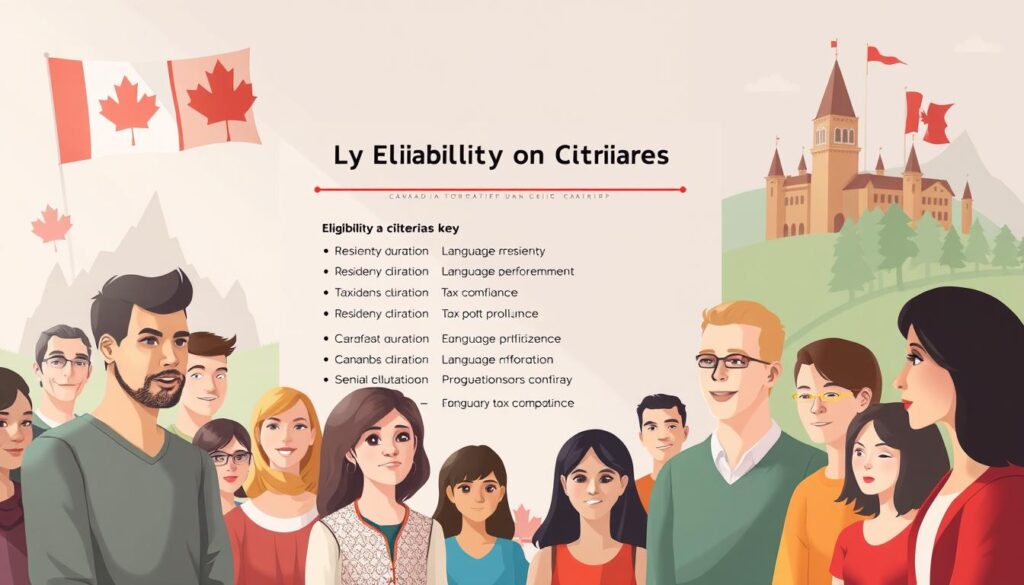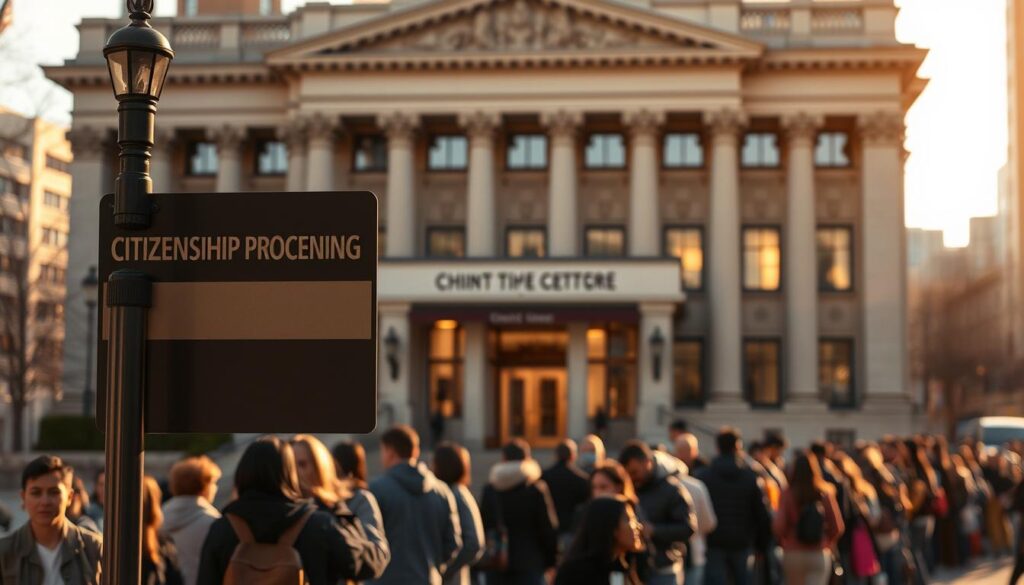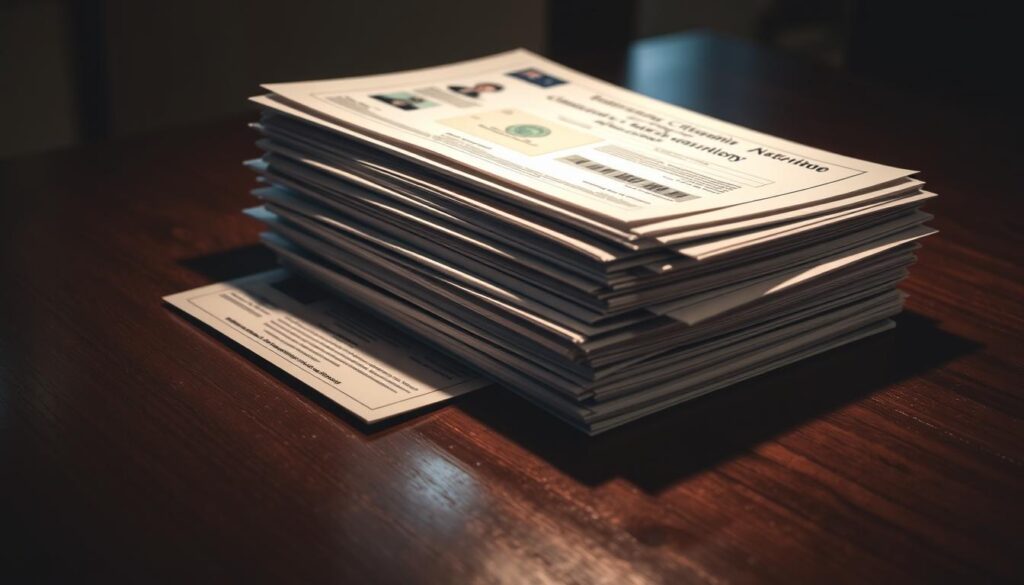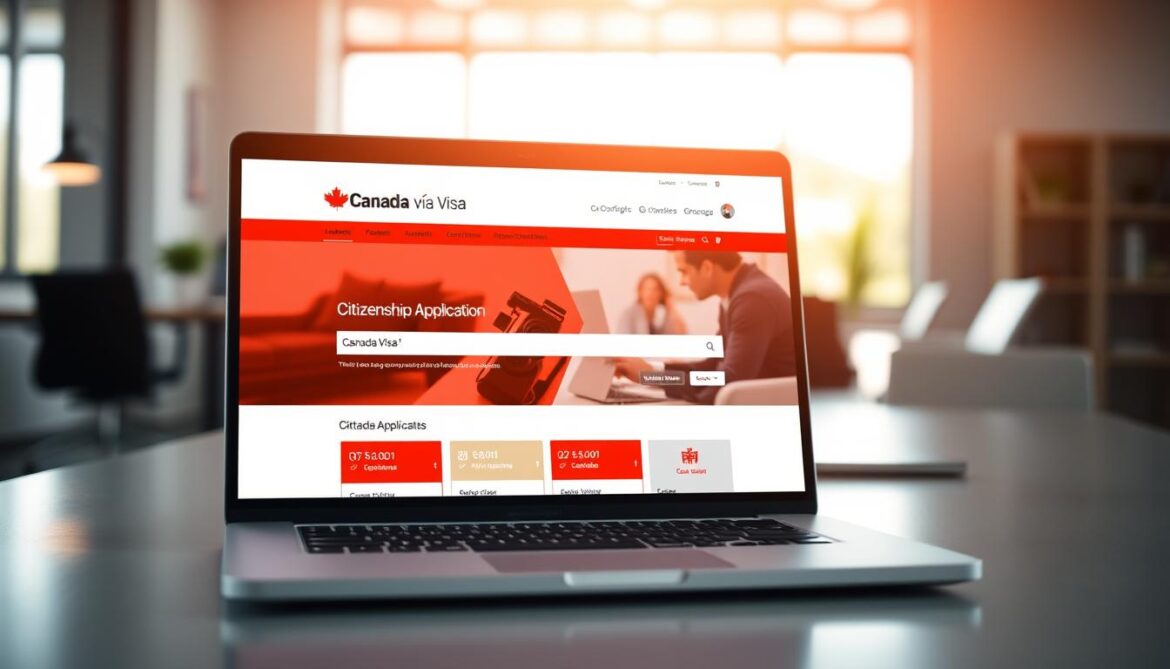Over 250,000 people apply for Canadian citizenship yearly, drawn by opportunities and quality of life. If you’re among them, the Canada visa portal is your official starting point.
Starting in 2025, costs for adult applicants will rise. This guide breaks down updates, requirements, and tips to navigate the process smoothly.
Processing typically takes 8 months. Partnering with ICC Immigration ensures you get expert help every step of the way.
Understanding the Fees of Citizenship Application
Costs vary by age and status—here’s what to expect. Whether you’re an adult, minor, or stateless, charges differ. Below, we break down each category to help you plan.
Adults 18 and Older
The total for adults is $649.75. This includes a $530 processing fee and $119.75 right citizenship fee. Payments are made online through the official portal.
Minors Under 18
Younger applicants pay only $100 for processing. No additional charges apply. Parents or guardians must submit proof of residency.
Stateless Adults Born to Canadian Parents
If you’re stateless but eligible, the right citizenship fee is $119.75. No processing cost applies here.
Note: Changes take effect April 1, 2025. Submissions before March 31 qualify for current rates under the *grandfathering clause*.
Who Is Eligible for Canadian Citizenship?
Becoming a Canadian citizen involves meeting specific criteria. Your status, time in the country, and language skills all play a role. Below, we break down the essentials.

Permanent Resident Status Requirements
You must be a permanent resident with no unresolved conditions. This means your PR card should be valid, and you must not be under review for immigration violations.
Physical Presence in Canada
You need to have lived Canada least 1,095 days (3 years) within the last 5 years. Temporary stays before becoming a PR may count for half days, up to 365 days.
| Residency Type | Days Counted |
|---|---|
| As a PR | Full days |
| Temporary stays (e.g., work permit) | Half days (max 365) |
Language Proficiency and Testing
Ages 18–54 must prove language proficiency in English or French (CLB 4). This involves submitting test results or education transcripts. You’ll also take a citizenship test on Canadian rights and history.
Note: Minors and seniors are exempt from language and testing rules. Tax filings for 3 years may also be required.
Breaking Down the Citizenship Application Costs
Understanding the breakdown of costs helps you budget effectively. Charges are split into mandatory and optional categories. Here’s what you’ll encounter.
Processing Fee
The processing fee covers the evaluation of your submission. For adults, this is $530. It’s non-refundable, even if your request is denied.
Right of Citizenship Fee
Before taking the oath, you must pay the right citizenship fee of $119.75. This confirms your commitment to becoming Canadian.
Additional Costs
- Citizenship certificate replacement: $75.
- Resumption or renunciation: $100 per request.
- Document searches: $75–$150, depending on complexity.
Note: Payments are final once submitted. Double-check your eligibility to avoid losses.
Recent Changes to Citizenship Fees
New adjustments to citizenship costs take effect in 2025, impacting how much you’ll pay. These updates apply to all categories, including stateless adults and minors. Here’s what you need to know to plan ahead.

2025 Fee Increase Explained
The right citizenship fee will rise by $19.75 for online submissions. Paper applications face a higher adjustment due to processing costs. Stateless individuals are included in this update.
Key deadlines: Submissions before March 31, 2025, lock in current rates. After this date, the new fees apply. Permanent residents should act early to avoid higher costs.
Grandfathering for Earlier Applications
If you submit by March 31, your payment remains at the 2024 rate. This applies to both online and paper forms. IRCC will notify applicants if balances are due after the increase.
- Online vs. paper: Online submissions save $19.75 under the new structure.
- Stateless adults: Previously exempt, now subject to the updated right citizenship fee.
“Timing your submission before April 2025 could save hundreds for families.”
How to Pay Your Citizenship Fees
Paying for your Canadian citizenship submission is straightforward with the right guidance. The official portal offers a secure online payment system, reducing errors and speeding up processing. Below, we outline the steps and methods accepted by IRCC.
Online Payment Process
To apply Canadian citizenship fees digitally:
- Log into the Canada visa portal using your GCKey.
- Select “Citizenship” and complete the fee calculator.
- Pay via credit/debit card—Visa, Mastercard, or prepaid cards accepted.
*Note*: Enable JavaScript for the portal to function. Save your electronic receipt immediately after payment.
Accepted Payment Methods
IRCC allows:
- Credit/debit cards (no Amex or Discover).
- Canadian bank drafts or money orders for paper submissions.
Warning: International cards may incur conversion charges. Always check exchange rates beforehand.
“Preserve your payment receipt—it’s proof of submission and speeds up processing.”
Citizenship Application Processing Times
Understanding how long your citizenship request takes helps manage expectations. While the IRCC aims for efficiency, delays can occur due to high volumes or incomplete submissions. Below, we outline typical timelines and variables that influence speed.

Current Average Wait Times
The official processing time averages 8 months from submission to decision. However, this varies based on:
- Backlogs from peak seasons (e.g., summer).
- COVID-19-related delays, though most are now resolved.
Factors Affecting Processing Speed
Applicants often face delays if their submissions lack documents like proof of residency or language test results. Security verifications add time, especially for those with frequent international travel.
To avoid setbacks:
- Submit all required paperwork upfront.
- Ensure translations meet IRCC standards.
“Complete applications reduce wait times by up to 30% compared to incomplete ones.”
Steps to Apply for Canadian Citizenship
Navigating the Canadian citizenship process requires careful planning and attention to detail. Each step, from gathering documents to submission, impacts your timeline. Below, we outline the key stages to ensure your journey is smooth.
Preparing Your Application
Start by verifying your eligibility using the CanadaVisa calculator. This tool helps confirm you meet residency and language requirements before applying.
Next, gather essential documents:
- Proof of permanent residency (e.g., PR card).
- Language test results (if applicable).
- Tax filings for the past three years.
Double-check the official checklist to avoid delays. Missing items are the top reason for processing setbacks.
Submitting Online vs. Paper Applications
Choosing between digital and physical submissions affects speed and convenience. Here’s a breakdown:
| Method | Pros | Cons |
|---|---|---|
| Online | Instant confirmation, faster processing | Requires scanned documents |
| Paper | No tech barriers | Slower, notarization needed |
Online submissions are recommended for speed. Paper applications suit those without reliable internet access.
“Digital submissions reduce errors and provide real-time updates—ideal for busy applicants.”
Whichever method you choose, keep copies of all forms and receipts. This safeguards against lost submissions.
Required Documents for Citizenship Applications
Gathering the right paperwork is crucial for a smooth citizenship journey. Missing or incorrect documents can delay your approval by months. Below, we outline the essentials to streamline your submission.

Proof of Permanent Residence
You must provide proof permanent residence, such as a valid PR card or travel document. If your card is expired, include the renewal receipt. IRCC verifies this first to confirm your eligibility.
Language Proficiency Evidence
Ages 18–54 need to submit test results (CELPIP, IELTS) or education transcripts. Scores must meet CLB 4 standards. Tip: Book tests early—processing delays are common.
Tax Filing Records
Include tax filing notices for the past three years. The Notice of Assessment copies are preferred. Self-employed applicants should provide additional business records.
Other documents you might need:
- Minor custody agreements (if applicable).
- Photo ID matching IRCC’s specifications.
- Translation certificates for non-English/French documents.
“Double-check your document checklist—the most common rejections stem from overlooked items.”
The Citizenship Test and Interview
Preparing for the citizenship test is a key step in your journey. This stage evaluates your knowledge of Canada’s history, values, and rights. Passing it brings you closer to taking the oath.
Test Format and Preparation Tips
The test consists of 20 multiple-choice questions. You’ll need to score at least 15 correct answers to pass. Topics include government, geography, and Indigenous rights.
Use the official study guide, *Discover Canada*, to prepare. Focus on chapters about elections and the Constitution. Pro tip: Take online practice tests to build confidence.
What to Expect During the Interview
After the test, an officer will verify your language proficiency and documents. They might ask about your residency or travel history. Bring originals of all submitted paperwork.
If you fail the test, you’ll get a second attempt. Rescheduling requires a valid reason, like illness. Applicants with disabilities can request accommodations.
“Arrive early and dress professionally—the interview is your chance to showcase commitment.”
The Oath of Citizenship Ceremony
The final step in your journey to becoming Canadian is the oath citizenship ceremony. This event formalizes your status and welcomes you into the country’s community. Whether virtual or in-person, it’s a milestone worth celebrating.

Virtual vs. In-Person Ceremonies
IRCC offers both options to accommodate applicants. Here’s how they compare:
| Type | Requirements | Timeline |
|---|---|---|
| Virtual | Stable internet, webcam, ID | Scheduled within 2–4 weeks |
| In-Person | Photo ID, ceremony invite | 3–6 weeks post-approval |
Digital ceremonies require you to:
- Join via a secure IRCC link.
- Show your ID to the officer.
- Repeat the oath aloud.
In-person events follow traditional protocols, including singing the national anthem. Both formats grant equal legal status.
Post-Ceremony Steps
After the ceremony, focus shifts to securing your Canadian passport. Here’s what to do:
- Wait for your certificate: Mailed within 2–6 weeks.
- Apply for a passport: Use the original certificate—copies aren’t accepted.
- Retain proof: Keep ceremony documents for future renewals.
“Your citizenship certificate is your golden ticket—guard it like one.”
Passport applications take 10–20 business days. Expedited services are available for urgent travel.
Common Reasons for Application Delays
Delays in citizenship approvals often stem from avoidable mistakes. By recognizing these issues early, you can streamline your submission and reduce waiting time. Below, we outline frequent hurdles and how to sidestep them.
Incomplete Applications
Missing signatures or unchecked boxes top the list of errors. IRCC returns these submissions, adding weeks to processing. Double-check every field before sending.
Other common oversights include:
- Expired IDs: PR cards or passports must be valid at submission.
- Outdated forms: Always download the latest version from the Canada visa portal.
- Mismatched photos: Follow 2024’s 50x70mm specifications with a neutral background.
Missing Fees or Documents
Underpayments or unpaid right citizenship fees trigger automatic pauses. Use the IRCC fee calculator to confirm totals. Include receipts with your submission.
Documentation errors cause 60% of delays. Avoid these pitfalls:
| Error Type | Solution |
|---|---|
| Uncertified translations | Use IRCC-approved linguists for non-English/French documents |
| Missing tax records | Attach all Notices of Assessment for the past three years |
“Resubmissions take 6–8 weeks to re-enter the queue. Accuracy saves months.”
Conclusion
Securing your future in Canada starts with the right steps. The 2025 updates bring changes, but the Canada visa portal simplifies navigation. Use it to track submissions and access forms.
For expert guidance, ICC Immigration ensures accuracy and speed. Their support minimizes delays, helping you meet residency and language targets efficiently.
Remember:
Canadian citizenship unlocks rights like voting and passport eligibility. Start early, stay organized, and leverage professional help for a seamless journey.



